Providing balanced nutrition for our large canine companions is a topic close to the hearts of many pet owners. The question often arises: Is opting for specialized large-breed dog food a necessity, or can regular dog diets meet the needs of our large and giant breed dogs?
In this discussion, we’ll navigate the unique nutritional requirements of large breeds, weighing the advantages of tailored food formulations and considering alternative dietary approaches.
A few topics we will discuss:
- Is large breed dog food a marketing gimmick
- How large breed dog food is different than regular food
- The nutritional requirements of large and giant breed dogs
- The best foods for big dogs

Large Dog Nutrition 101
As if choosing dog food wasn’t confusing enough, the truth is that large and giant dogs such as shepherds, Great Danes, and mastiffs have much different nutritional needs than a chihuahua.
Large and giant formulated dog foods provide necessary and important nutrition that will support healthy growth, healthy joints, and energy for big dogs.
What is the difference between large-breed dog food and regular dog food?
A properly formulated large-breed dog formula will have a few key differences when compared to standard adult maintenance or regular puppy formulas.
The first, and most important difference is the calcium to phosphorus ratio.
This ratio is very important in growing large and giant breed puppies as it helps control the rate of skeletal growth.
If this ratio is too high, rapid growth can cause growth deformities and pain from knuckling or panosteitis (growing pains).
Nutrition for a growing puppy (especially a super-sized one) is a key consideration when it comes to preventing environmental hip dysplasia, poor muscle development, and other orthopedic disorders that are common in big dogs.
Not to scare you here, but choosing the wrong food can be detrimental to muscle growth and the development of healthy bones.
What is Knuckling in Puppies?
Puppy Growing Pains: Does Nutrition Cause it?

IS GRAIN-FREE FOOD DANGEROUS?
Is large breed dog food needed?
Large and giant breed dog foods that are well-researched and formulated by board-certified veterinary nutritionists (DACVN) will also have the correct levels of fat and protein to support their size and energy needs.
Many will also have added nutrients and supplements for gut health, joint support, and healthy skin such as additional vitamin d, DHA, EPA, Glucosamine, taurine, and the correct balance of fatty acids.
Small breed dogs do not have the same needs; their bodies grow and burn energy in different ways.
In other words, choosing an ‘all-life stages’ or ‘all-sizes’ dog food is like trying to fit your entire family into the same pair of one-size-fits-all pajamas – it might work, but is it ideal?
The best way to ensure that your large or giant breed dog is getting the nutrition he or she needs in its food bowl is to feed a food that has been specifically formulated for its size, age, and activity level.
9 Things All Puppy Owners Need

Can I feed large breed dog food to a small dog?
While smaller dogs could eat foods that were formulated for bigger dogs, doing so long-term could be detrimental to their health.
Small breed dogs have different nutritional needs that should be addressed with a scientifically formulated food that was designed to meet their specific requirements.
We should also mention that large and giant breed kibbles are often larger in size, which could make it difficult, frustrating or even painful for smaller breeds to chew up.
Lastly, small dogs typically have a higher metabolism and need more calories per pound than their larger counterparts.
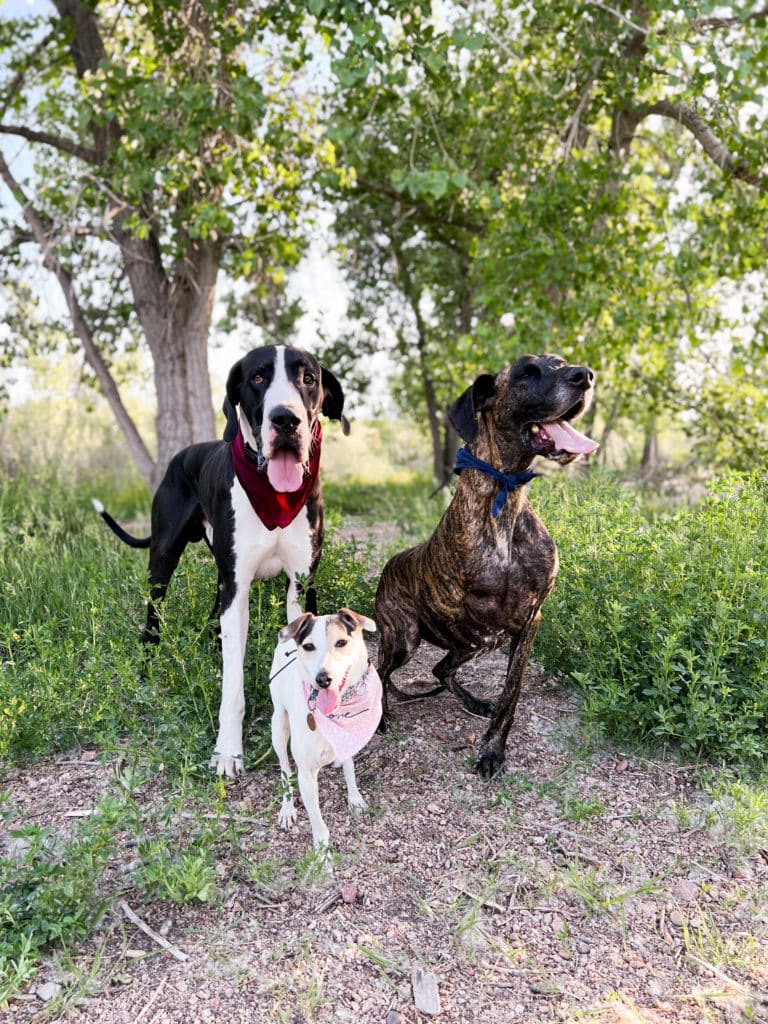
Is grain-free dog food good for large breed dogs?
Grain-free kibble is often marketed as being a healthier, more natural option.
However, there is no evidence that grain-free diets are any better for dogs than those that contain grains.
As a matter of fact, grain-free and boutique dog foods are tied to a significant increase in nutritional DCM heart failure, likely because many formulas are unbalanced and often heavy in peas and legumes.
Nutritional DCM causes sudden congestive heart failure in dogs who often appear robust, shiny, and healthy just moments before their death. Dogs with undiagnosed nutritional DCM are a ticking time bomb.
While many large and giant dogs may be prone to this condition for genetic reasons, incorrect nutrition is also to blame.
You should never feed a grain-free or boutique kibble diet to your Great Dane or any other large or giant breed dog.
Read about this dirty pet food trick
Does Grain-Free Food Cause Heart Failure?
Understanding Dog Food Labels
It’s important to understand that not all foods are created the same.
Understanding this can help you simplify your search for the best nutrition for your pet.
Many dog foods are created from a computer algorithm, created to meet nutritional minimums on paper and look appealing to the buyer.
Occasionally, somebody with moderate nutrition credentials may help with the formulation, or a veterinary nutritionist may be commissioned temporarily to sign off on the food (indicating that it meets the basic legal nutrition requirements).
These foods are sold at a premium price with eye-catching ‘natural’ and ‘holistic’ marketing. They often include ingredients such as squash, blueberries, and deboned meats.
This can make it difficult and confusing for consumers to know how to choose a healthy balanced diet for their pets, especially when we consider the fact that 300-400 new premium boutique food brands hit the market every year!
When you read labels and look at the ingredients in a bag of dog food, you must look past the marketing.
“Holistic”, “super-premium” and “human grade” are unregulated terms that have no legal definition.
Read on below to learn more about how to choose a dog food that was formulated correctly and ethically for your pet’s health and well-being!
What is the WSAVA, and are they biased?
How to STOP Overfeeding Your Dog!
Is Your Dog a Picky Eater? Read Here for Tips
Is the Dog Food Advisor a good source of information?
The Dog Food Advisor is a click-bait affiliate income blog run by a human dentist. Take that for what it’s worth.
Your veterinarian (and the board-certified Veterinary Nutritionists and journals that they get their information from) will be a much better source of nutrition information for your pet.
We have made a conscious effort on our blog to be science-based when it comes to health and nutrition. However, you should still talk to your veterinarian.
Many ‘highly rated’ foods on Dog Food Advisor were scientifically proven to be associated with multiple cases of nutritional DCM; a condition that can often be reversed in dogs that are put on a different diet.
Large Breed Puppy Food
Large breed puppy food will be formulated with the correct levels of energy and nutrients to support proper growth and muscle development.
Unlike adult dogs, puppies need more nutrition. However, it’s important to not overdo it! Don’t overfeed your puppy.
Most importantly, large breed adult and puppy dog foods will have a calcium to phosphorus ratio that is lower than what you’ll find in many standard puppy foods.
This is essential for preventing skeletal problems now and down the road. A dog’s risk of developmental growth disorders such as knuckling, pain, HOD, and limb deformities is much higher when a dog eats too much or is offered the wrong food.
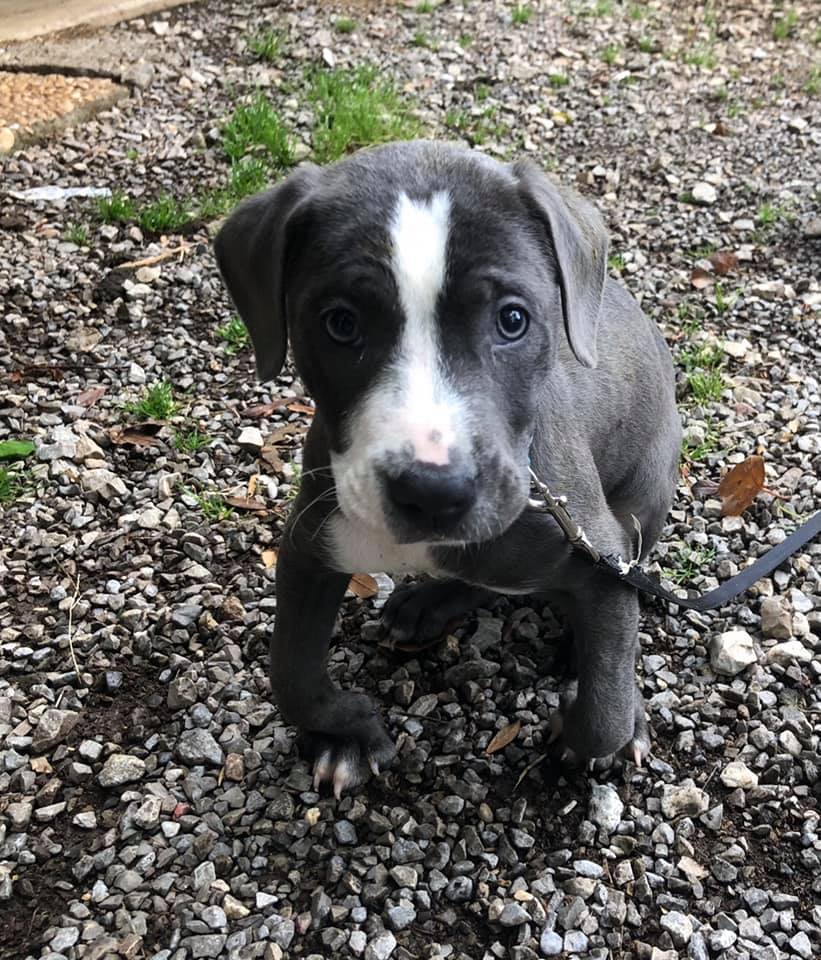
IS YOUR GREAT DANE PUPPY KNUCKLING?
Check out our science-based and constantly growing knuckling resource page.
What is considered a large breed puppy?
Large breeds are dogs that are going to weigh over 50 pounds as adults.
Some popular large breed dogs include the Labrador Retriever, Golden Retriever, German Shepherd, Rottweiler, and Boxer.
Many research-backed dog food manufacturers consider giant breeds to be the same as ‘large breeds’, as their requirements for nutrition are similar. If you have a giant dog, ‘large’ foods will be appropriate as well.
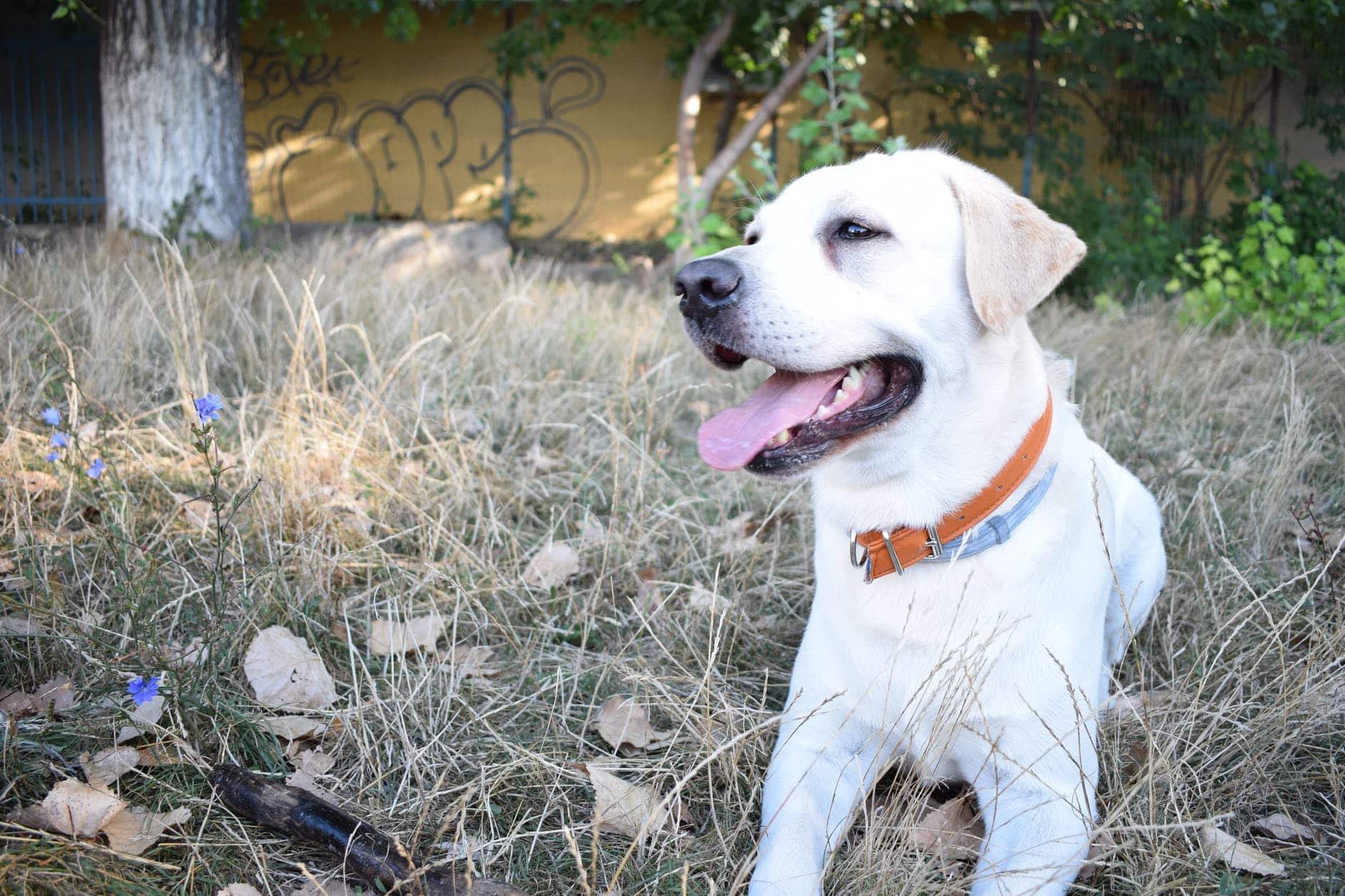
When should I switch from large breed puppy to adult food?
This largely depends on the manufacturer.
Many brands will have you switch to adult food once your dog reaches 70-80% of his or her projected adult weight.
Others may recommend waiting until your dog is a year old or even 18-24 months old before switching them over.
The best way to determine when to make the switch to adult food is by following the manufacturer’s recommendation and the advice of your veterinarian.
Purina Pro Plan Large Breed Sensitive Skin and Stomach Salmon Puppy food, for example, should be fed until 18-24 months.
Royal Canin has a line of foods formulated specifically for giant breed dogs (100lb + adults) with targeted nutrition based on age. Puppy for dogs up to 8 months, Junior for dogs 8-24 months, and adult for dogs 24 months and up.
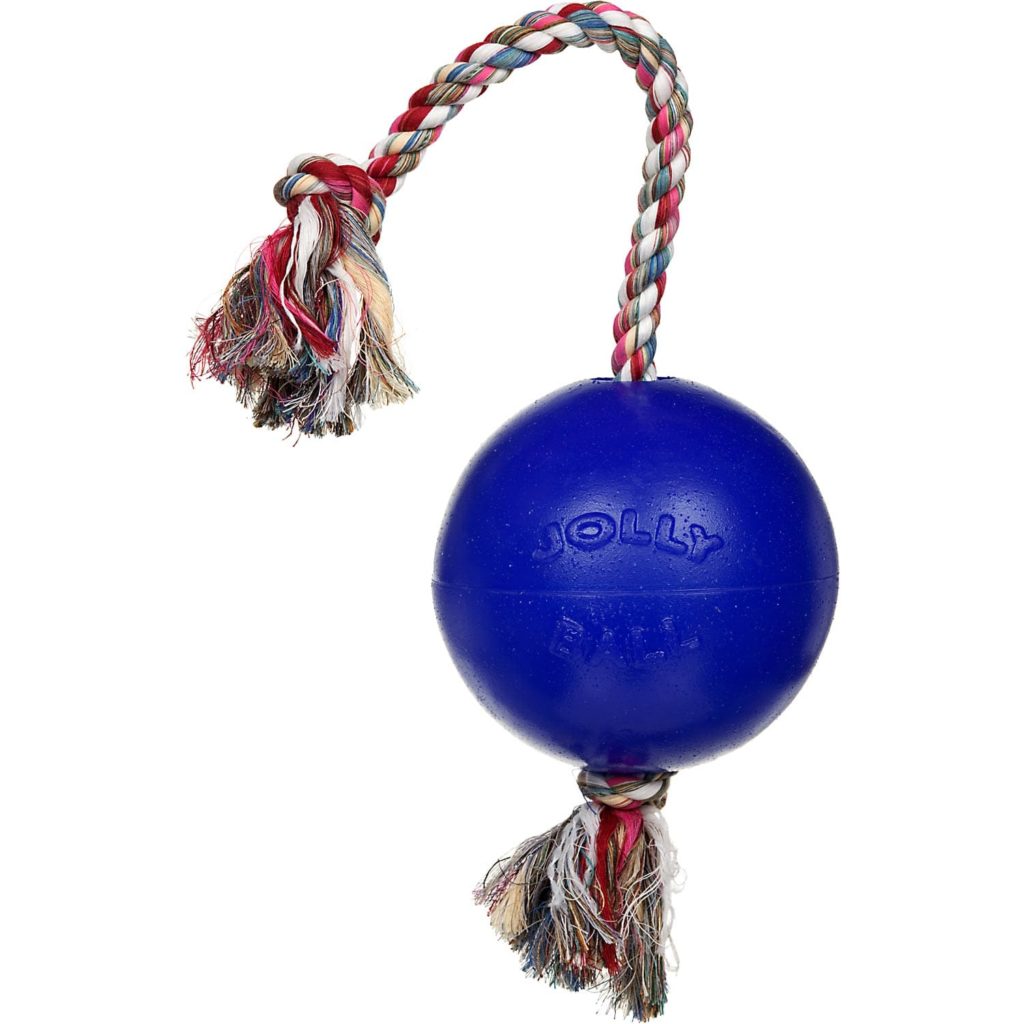
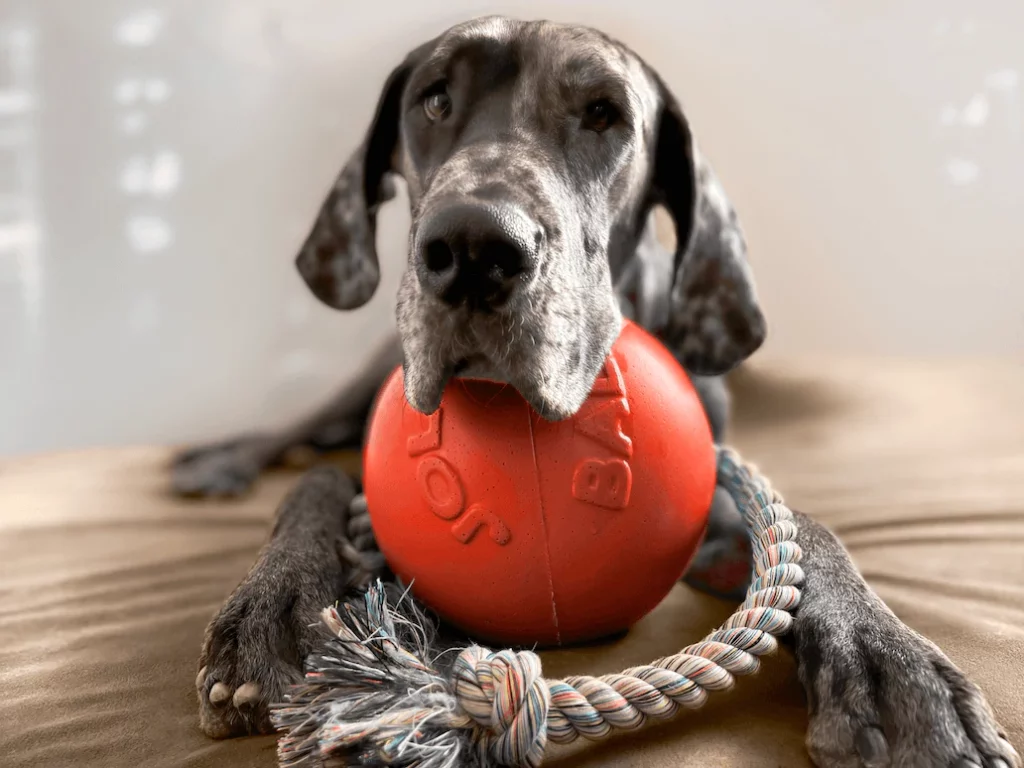
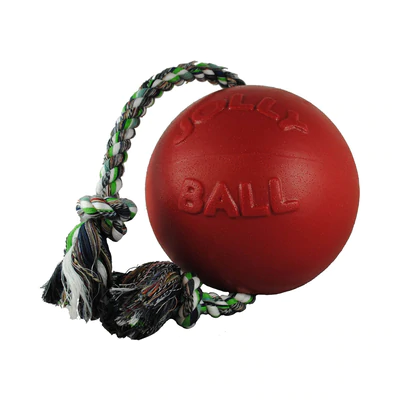
What are the best large breed puppy foods?
Here is our list of the best large breed puppy foods.
All of these are also appropriate for giant breed puppies, including Great Danes!
Click on any to view on Chewy (our favorite place to auto-ship pet foods).
- Purina Pro Plan Large Breed Puppy – any flavor!
- Purina Pro Plan Sensitive Skin & Stomach Large Breed puppy – TOP PICK, salmon-based
- Eukanuba Large Breed Puppy (Great for active and sporting dogs)
- Purina One Large Breed Puppy (Excellent budget option)
- Hill’s Science Diet Puppy Large Breed
- Royal Canin Giant Puppy Dry Dog food (to age 12 months) – TOP PICK, PREMIUM OPTION
- Royal Canin Giant Junior Dry Dog food (8-24 months)
- Purina Large Breed Puppy Chow
Check out THE GIANT DOG FOOD PROJECT to compare brands and values.
Here is a great article on why dog food ingredients are misleading and aren’t always the best way to make educated decisions about your dog’s nutrition! https://vetnutrition.tufts.edu/2016/06/why-you-shouldnt-judge-a-pet-food-by-its-ingredient-list/

Giant Breed Dog Food
Giant breed dogs have very similar nutrition needs as large dogs, however, special attention should be paid to their muscle development and orthopedic health.
What is considered a giant breed puppy?
A giant breed puppy is one that is going to weigh over 90 pounds as an adult.
It’s important to note that an overweight large breed dog tipping the scales at 90 lbs is NOT considered a ‘giant breed’.
Giant breed dogs include Newfoundland, Saint Bernard, Great Dane, Mastiff, and Irish Wolfhound.
Is there a giant breed dog food?
As of this writing, there are only TWO research-backed formulas made specifically for giant breed dogs.
Royal Canin Giant Breed
This formula is a top-tier food choice for your dog and while it’s pricy, it’s also one of the best options. Because it is so nutrient-dense, you may find that your dog doesn’t eat (or poop) as much on this formula. RC Giant Breed contains by-product meal, which sounds scary, but is closer to being biologically appropriate for dogs than deboned muscle meat.
Royal Canin is heavily researched and has created a series from puppyhood to adult that is perfect for giant breed dogs, providing correct nutrition for every stage of life.
Many giant dogs absolutely thrive on this food.
Royal Canin Giant Puppy (to age 12 months)
Royal Canin Giant Junior (8-24 months)
Royal Canin Giant Breed (from age 24 months +)
Click on any below to view.
Purina Pro Plan Giant Breed
This formula is hard to find and may have been discontinued or temporarily suspended (2022). It is for adult giant breeds only.
Giant puppies should be fed one of the Pro Plan Large Breed Puppy formulas listed below until 18-24 months, and then can be transitioned to the giant formula (if available).
If you cannot find Pro Plan Giant Breed for your adult Great Dane, consider the following alternatives:
Purina Pro Plan Sensitive Skin and Stomach Large Breed (Salmon)
Purina Pro Plan Large Breed Shredded Chicken & Rice (Large Pieces & Chicken Shreds!)
Purina Pro Plan Large Breed Weight Management (Get the weight off)
Purina Pro Plan Large Breed Bright Mind Age 7+ (for Senior Great Danes)

Other options:
Earthborn Holistic makes a giant breed dog food formula.
Earthborn is not, however, backed by the same level of science, research, and dedication to qualified Veterinary nutritionists as Purina and Royal Canin.
The Earthborn brand has multiple cases of nutritional DCM associated with it, and we don’t recommend feeding it. It also utilizes several forms of ingredient splitting, to trick you into thinking the food is more natural and nutrient-focused than it is.
Blue Buffalo now also has a joint support food out with a Dane on the label that they claim is ‘science-based’.
Unfortunately, Blue Buffalo does not have a good track record, and the veterinary community does not typically recommend this brand for numerous reasons.
In sticking with actual science and research, we don’t recommend it either.
How to choose food for your dog
It’s actually very simple to choose a kibble food for your dog when you look at science and research instead of marketing!
We only share brands that meet the following 4 basic ethics requirements for manufacturing dog food:
- Utilizes at least one full-time on-staff board-certified veterinary nutritionist who formulates the food
- Participates in peer-reviewed research and science for the greater good of companion animal health and to better inform their nutritional formulation decisions
- Owns and operates their own facilities (no co-packing)
- Utilizes feeding trials to substantiate their kibbles in real life, not just on paper
Only a few brands legitimately meet these requirements: Purina, Royal Canin, Iam’s, Hill’s, and Eukanuba.
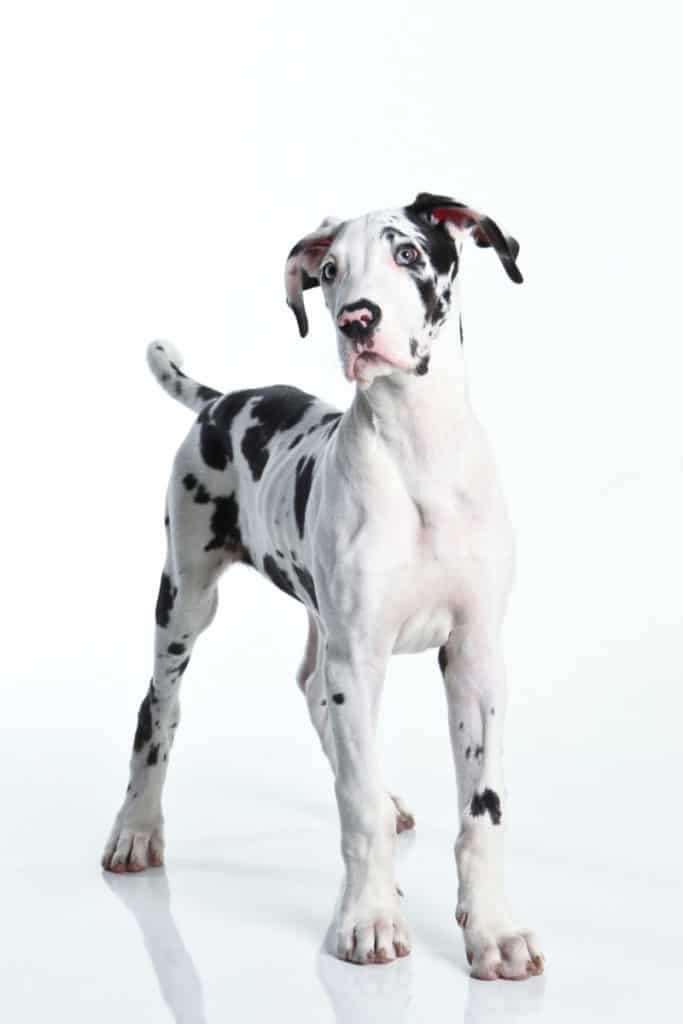
WHAT IS PUPPY CULTURE?
The best foods for large breed puppies
Here is our list of the best foods for large pups who will be over 50lbs as an adult. Click on any to view.
Purina Pro Plan Large Breed Puppy
Purina Pro Plan Sensitive Skin & Stomach Large Breed puppy – OUR TOP PICK
Eukanuba Large Breed Puppy
Purina One Large Breed Puppy
Hill’s Science Diet Puppy Large Breed
Iam’s ProActive Health Smart Puppy Large Breed Dry Dog Food

The best foods for giant breed puppies
Giant puppies have similar nutritional needs to large breeds.
Any science-backed food from the list below will be appropriate for dogs that will be over 100lbs as an adult:
Purina Pro Plan Large Breed Puppy
Purina Pro Plan Sensitive Skin & Stomach Large Breed puppy – TOP PICK
Eukanuba Large Breed Puppy
Purina One Large Breed Puppy
Hill’s Science Diet Puppy Large Breed
Iam’s ProActive Health Smart Puppy Large Breed Dry Dog Food
Royal Canin Giant Puppy Dry Dog food (to age 12 months) – TOP PICK
Royal Canin Giant Junior Dry Dog food (8-24 months)
Never feed small breed foods to giant dogs.
These formulas are generally higher in calories and carbs, plus the small kibble size may make it easy for them to eat too quickly (increasing their risk of bloat, a deadly disease).
Additionally, the most current research indicates that giant and large puppies should be fed a science-backed large or giant breed PUPPY food!
We do not recommend feeding adult food to puppies, especially dogs that will be 50-100 or more lbs as an adult.
While it used to be said that giant puppies should only be fed adult food, this outdated advice was based on speculation and not science.
Puppies need different levels of calcium, phosphorus, energy, and other nutrients than adults or any size.
Feeding incorrect food, including adult formulas, to a giant breed puppy, can actually cause developmental orthopedic disease (DOD) due to too little calcium or too much calcium.
Additionally, adult foods don’t have the calories, protein, and fat that a puppy needs for robust muscle development, brain development, and energy.
Great Dane pups raised on adult foods are often hopelessly lanky with poor muscle tone. They are nearly malnourished until maturity because of this. We are so excited that new research gives Dane pups the nutrition they need to thrive!

The best foods for large and giant breed senior dogs
Senior dogs require lower calories and additional cognitive and joint support. Here is our list of the best foods for mature large and giant senior dogs.
Purina Pro Plan Large Breed Weight Management (Get the weight off)
Purina Pro Plan Large Breed Bright Mind Age 7+ (for healthy senior dogs)
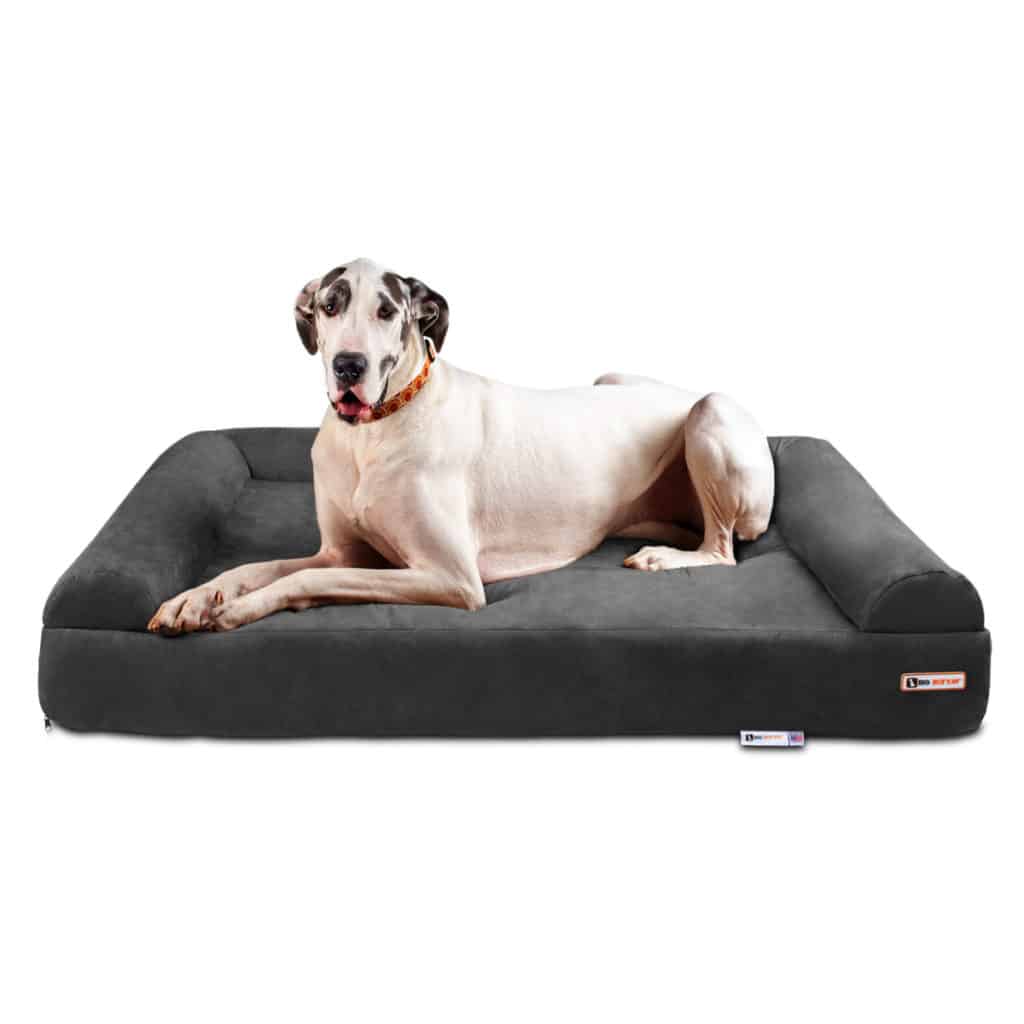

Common Ingredients in Large Breed Dog Foods
Here is some information about common ingredients in giant and large dog foods. We hope this helps you dispel some myths you may have read on social media!
Meat Meals and Meat By-Product Meals
Many people believe that meat meals and meat by-product meals are lower-quality.
This is because many humans prefer choice cuts of meat, grilled to perfection…not the bones, organs, fat, and skin that dogs want and need in their diet.
The truth is that meat meals and by-product meals are highly digestible sources of protein, containing all of the essential amino acids your dog needs.
Meat meals of any kind, including meat by-product meals, will be closer, nutritionally, to a species-appropriate raw diet than fresh muscle meats will be.
Meat meals and meat by-product meals are also great sources of calcium, phosphorus, glucosamine, and other minerals. In fact, meat meals are often used as a natural source of these minerals in pet foods.
Because meat meals are processed and dehydrated before cooking, when they show up at the top of an ingredients list, they stay there after cooking, too.
So, if you see “chicken meal” or “chicken by-product meal” as the first ingredients in a food, that means there’s likely more meat and more species-appropriate nutrition in the food than if “fresh chicken” was used instead.
Fresh muscle meat sounds appealing to humans, but it is 70% water and doesn’t contain the same nutrition, amino acids, and joint support that a dog should be getting from bone, connective tissue, and organs.
Large breed puppies, adults, and giant dogs of all ages need meat and meat by-products in their diet.
As a matter of fact, foods with meat meals have been shown to help reduce the risk of bloat in dogs!
What is Ingredient Splitting and is it bad for my dog?
5 Reasons to E-Collar train Your Dog

Chicken Fat
Chicken fat is a necessary and high-quality ingredient for large breed dogs. It’s a natural source of omega-six and omega-three fatty acids, which are essential for your dog’s coat and skin health.
Chicken fat is also an excellent source of meat-based energy for dogs. In fact, it’s one of the most calorie-dense ingredients in pet food.
Remember, just because us humans think it’s gross doesn’t mean it’s bad for our dogs!
Fish Oil
Fish oil is a natural source of omega-three fatty acids, which are excellent for your dog’s coat and skin health.
Fish oil is also a great cognitive support ingredient. It’s been shown to improve memory, learning, and attention in dogs.
Many well-formulated large-breed puppy foods and adult foods contain fish oil.
Glucosamine and Chondroitin Sulfate
Glucosamine and chondroitin sulfate are natural ingredients found in the connective tissue of animals. Remember the ‘by-product’ meal? Yes, that.
These ingredients are excellent for joint health. They’ve been shown to slow the progression of osteoarthritis and improve joint function in dogs.
Many large breed puppy foods and adult foods contain added joint support, either added as a supplement or from the meat meals and by-product meals included in the formula. Look for a brand that tells you what balance of glucosamine and chondroitin sulfate is in the finished dry product.
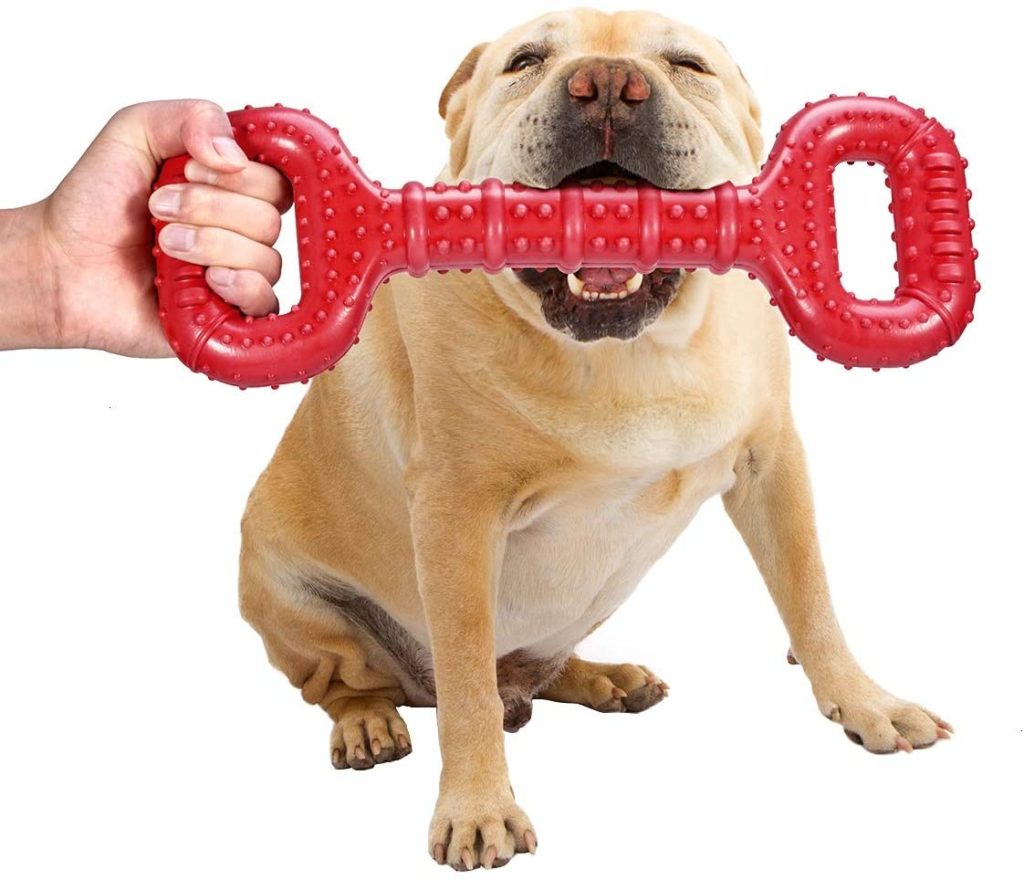
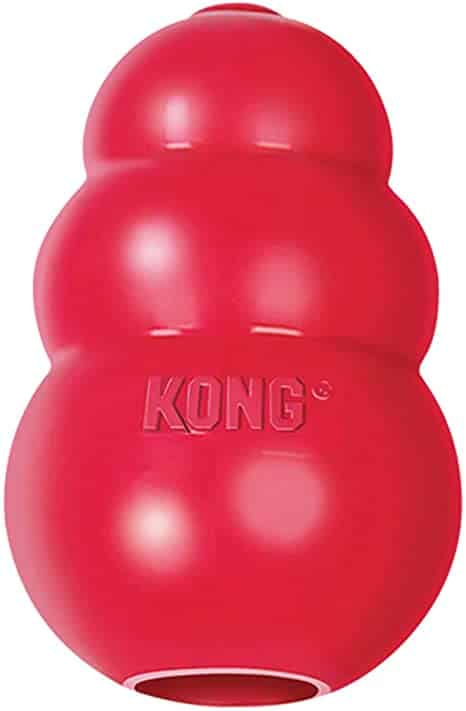
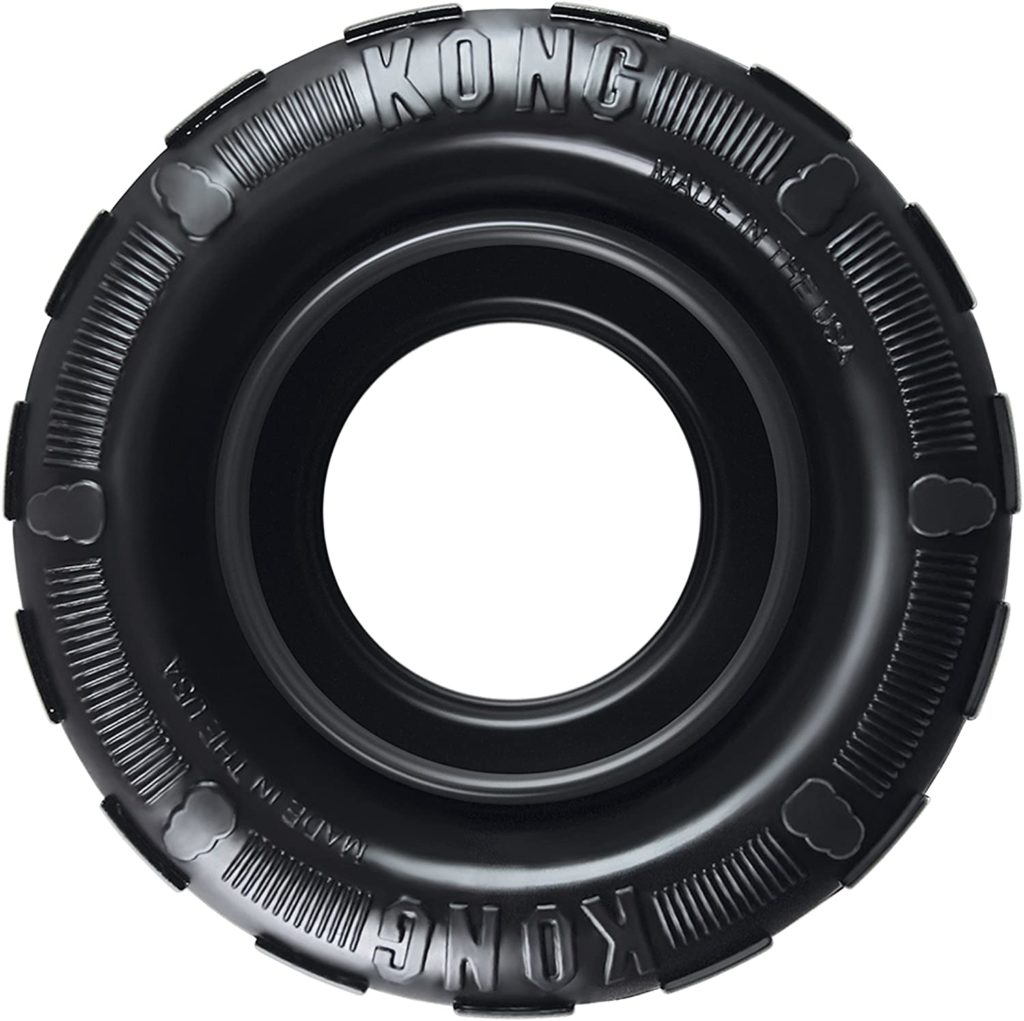
Overall, large breed dog foods are necessary for giant and large breed puppies, adults, and seniors.
They contain more nutrients, calories, and protein than smaller breed dog foods. Additionally, they often have special ingredients for joint health and cognitive support. If you have a large or giant breed dog, be sure to feed them food that is formulated specifically for their life stage!
We have a lot of articles on this topic and love sharing the most up-to-date research-backed nutrition information you’ll be able to find.
READ MORE:
Off-Color & ‘Designer Color’ Great Danes
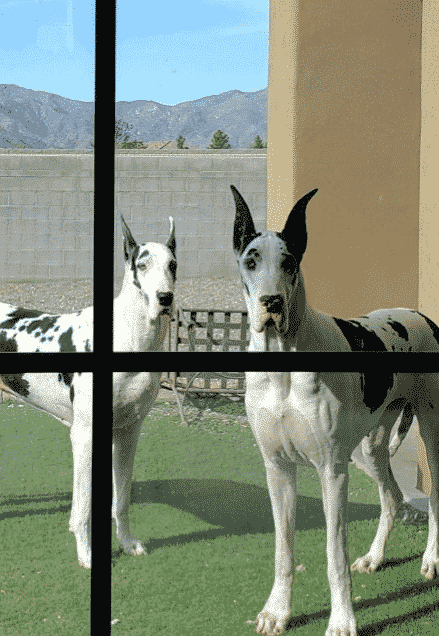
JOIN OUR COMMUNITY
Do you like modern positive+balanced off-leash dog training, science-based information, life with Danes, educated ownership and chatting with other like-minded people?
Join our growing Facebook group!

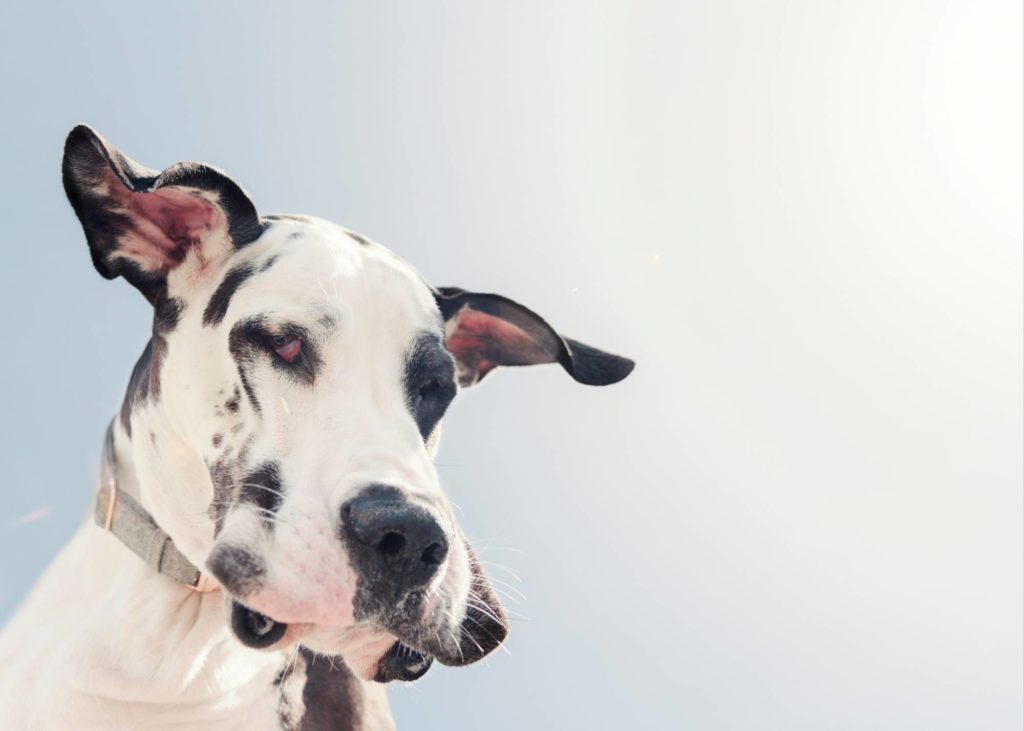
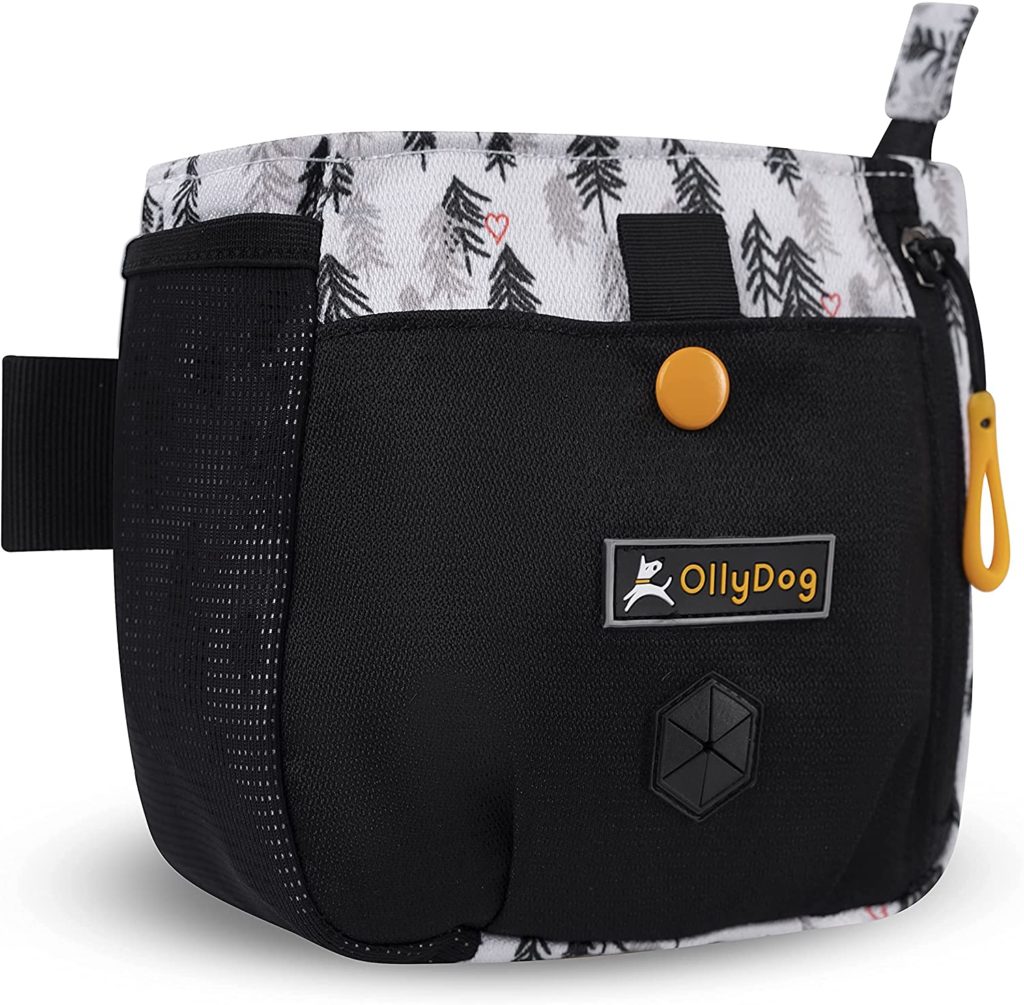
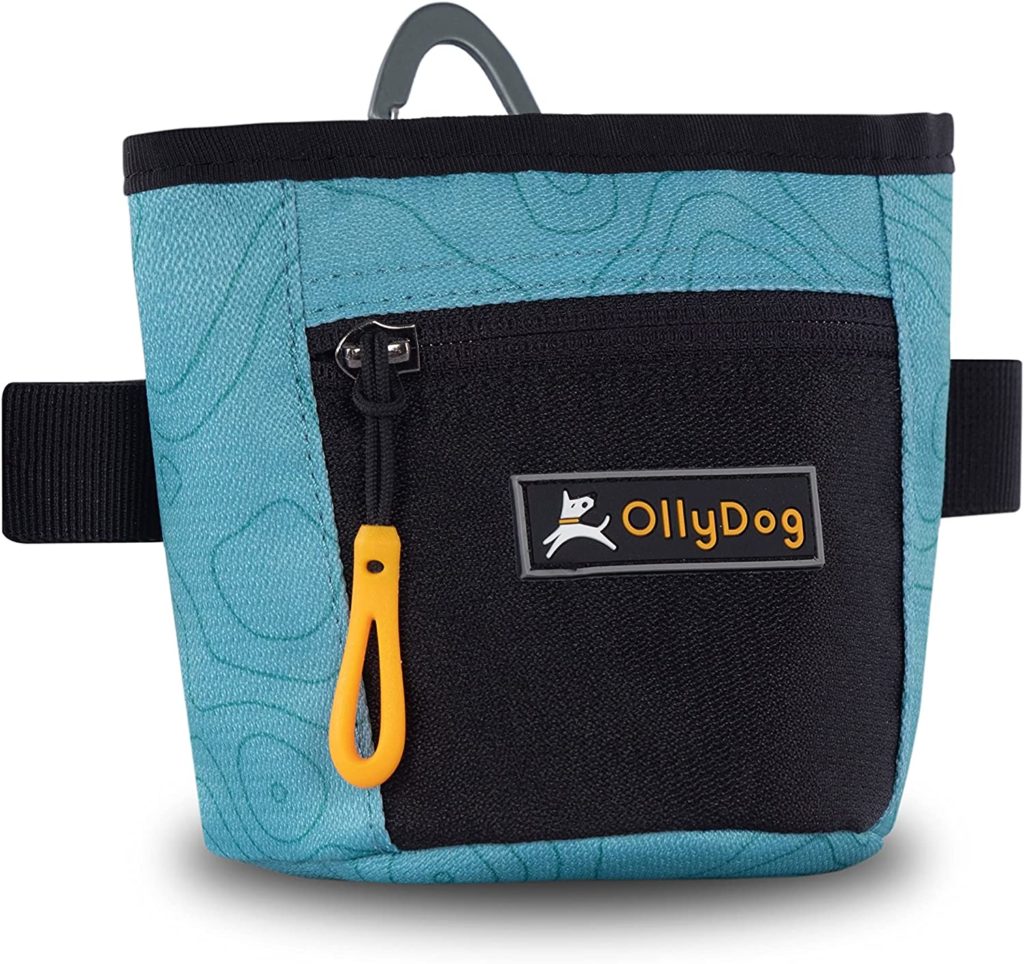

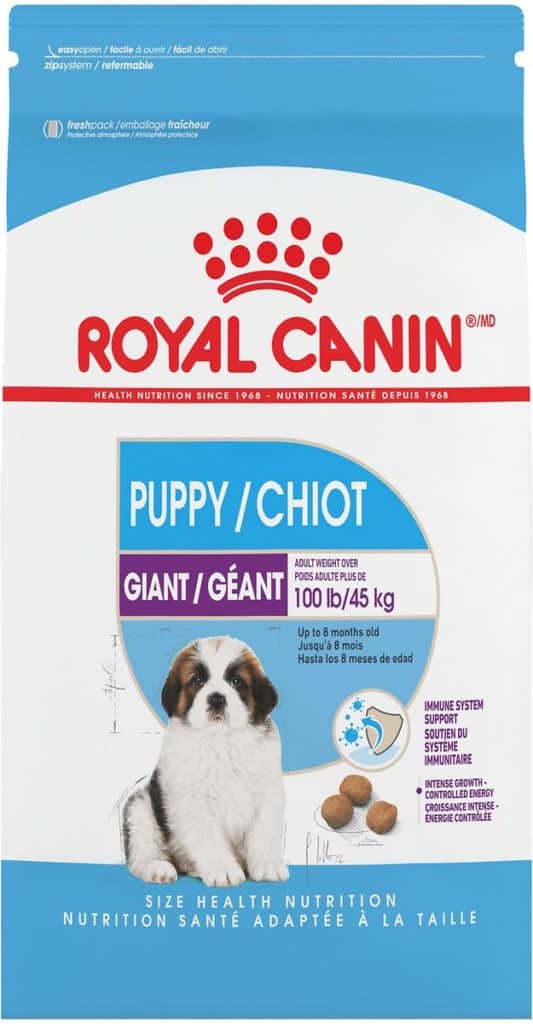
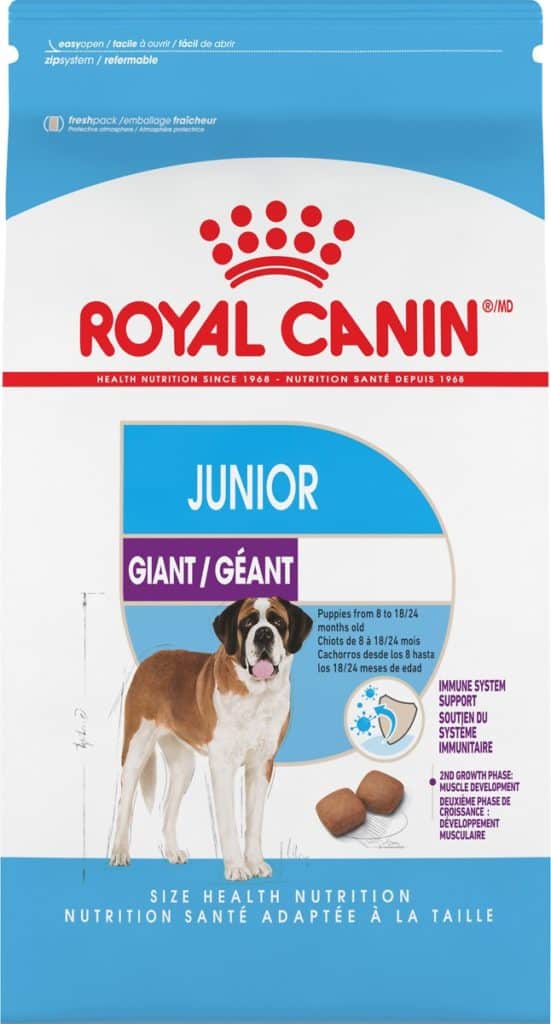
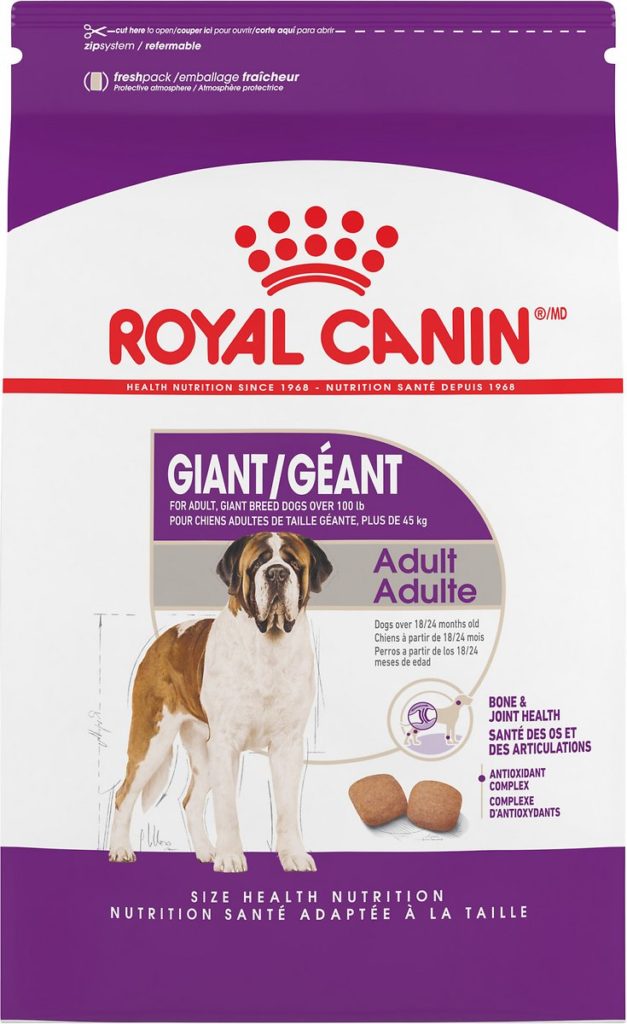
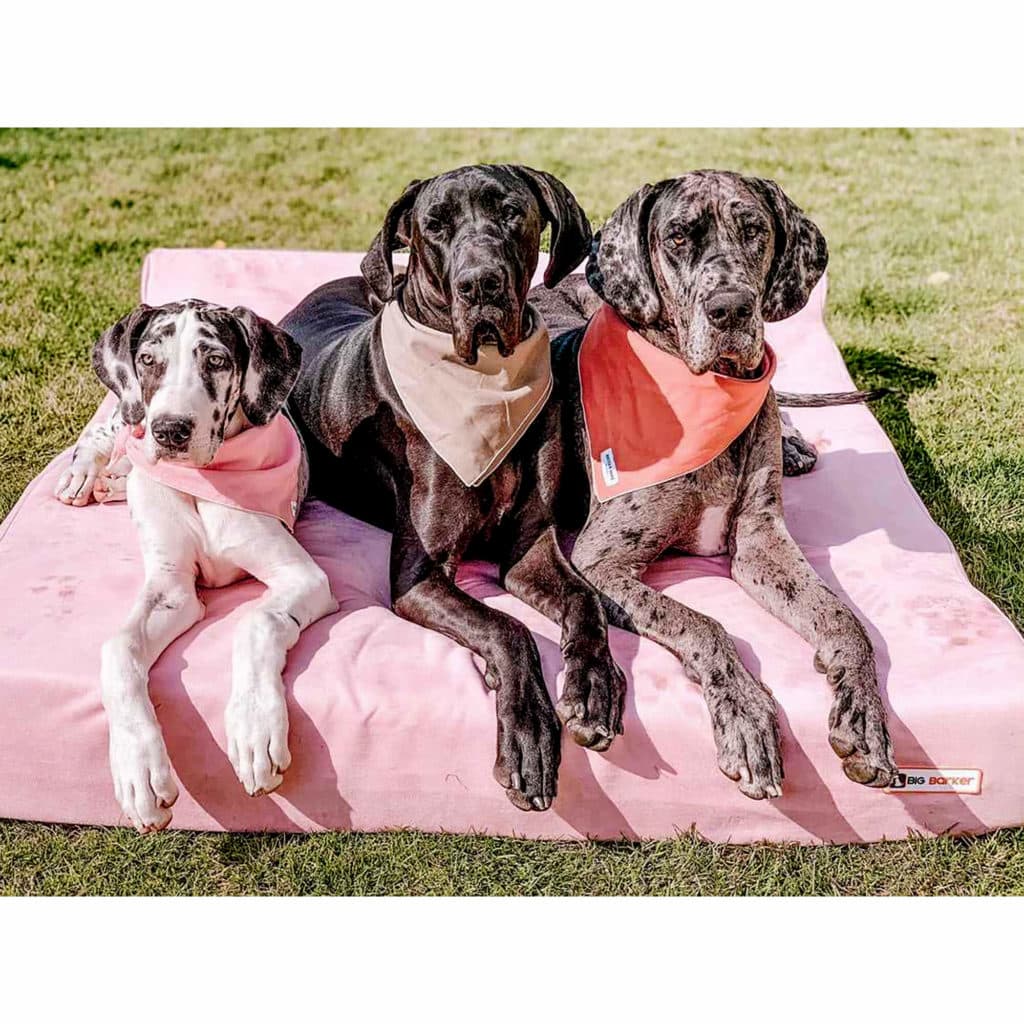
Leave a Reply